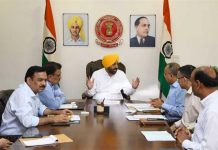
At the head of every good school is a strong, innovative and motivated principal. “To change 1 billion people in India for the better, you need to change the 7 lakh government school principals in our 7 lakh villages,” says Mumbai-born Aditya Natraj, who has set out to achieve just that. His is the classic story of a man who chucked a high-flying corporate career to follow his heart and listen to the nagging voice within that told him to take up a cause.
With an MBA from INSEAD in France and a job as a chartered accountant in London, Natraj’s life seemed set on a course of corporate conquests. But he never forgot the disparity he had seen in his own family. His grandfather was one of 11 children, one of the four to get a college degree. His father, one of 54 first cousins, was one of the few privileged ones to benefit from his parent’s higher education. So, while Natraj and some of his immediate cousins ended up at the higher end of the economic spectrum, others within the same family are below the poverty line. “All because they did not get the kind of education we did,” he says emphatically. “It’s not about ability. We are all from the same gene pool. It’s about opportunity.”
It’s this family history that eventually triggered the shift to social entrepreneurship. Perhaps sensing this leaning, his father voiced his fears to Natraj. “He was worried I would end up a jhola-carrying social activist with no money,” he says.
In 2003, with all his student loans paid off, in a now-or-never moment, Natraj took the plunge. He quit his job to join Pratham, India’s largest NGO in the field of education. Five years of visiting government-run primary schools across the country led him to an interesting statistic: 15 percent of schools that run well have proactive principals; 15 percent with cynics at the top are in the worst shape; and a massive 70 percent just manage to stay afloat because their heads want to do something, but don’t know how.
This led Natraj to the kernel of an idea: to harness the leadership provided by school principals. The idea got set in stone after an experience he had in Kutch, Gujarat, after the devastating earthquake of 2002. That’s where Natraj came across a unique school principal. When most government school staff were getting themselves transferred out of earthquake-hit areas, Saurabh Patel transferred to Kutch’s Rapar city. There were no local teachers and the literacy rate was the lowest in the state. Patel convinced Unicef to give him a tent and restarted the local school. Because of one man’s initiative, the number of students went up to 120, from the 87 enrolled before the earthquake.
In 2008, Natraj set out with a team of seven to educate the principals of government schools in Rajasthan’s Jhunjhunu district on how to manage schools, work with children on the basis of trust, and motivate teachers. It was the start of what is now called the Kaivalya Education Foundation, with its unique Principal Development Leadership (PLD) programme and the Gandhi Fellowship. The foundation has now expanded to a team of around 400 people, with projects running across Gujarat, Rajasthan and Maharashtra.
Funded by corporate donations, Kaivalya works by signing MoUs with state governments, which arrange meetings with government school principals in various districts. “About 93 percent of the principals apply to join the PLD programme,” says Natraj. The programme comprises 12 intensive workshops a year, for three years.
“We have to go beyond the anger to make them at least want to try to change,” says Natraj. The workshops rely heavily on dialogue. The principals are asked to recall moments during their school days when they were discriminated against or beaten by their teachers. These long, difficult and deeply reflective exercises often leave the participants in tears, but help them empathise with their students.
“I used to keep a stick with me all the time. I thought beating a child was the only way to discipline him,” recalls Ramawtar Sadlania, 50, a government school principal from Jhunjhunu. “But they taught me how to sit with children and talk to them, instead of talking down to them.” Sadlania was part of the first PLD programme in 2008. During the programme, Sadlania had many arguments over the necessity of fear for discipline, before he let go of his anger.
A changed principal leads his staff by example. Natraj and his team are trying to create a positive self-sustaining cycle, where principals inspire or cajole each other into doing better.
Pushkar Meena, 40, another government school principal from Jhunjhunu, testifies to this change. He is in his second year of the PLD programme and his school’s enrolment has gone up from 115 to 146. He was inspired by other principals from his district who had been part of PLD.
Simultaneously, Gandhi Fellows are recruited from the top colleges in India and trained to work in government schools in tandem with these school principals. Every Fellow is placed for four weeks with a host family in the village or slum where the school they are assigned is located. During that period, they have to earn their living doing whatever their host does, be it pulling rickshaws, working as maids or herding cattle. They act as channels of communication between the principals and the local community.
Living among the villagers, they understand why the children do not go to school, the problems they face at home, the everyday violence they are exposed to. They learn how to keep the children in school and deal with them without raising a hand. “Biases don’t just exist in schools, they are part of the social fabric,” says Natraj. “That’s what we are trying to change.”
Geetanjali Babbar, 26, a graduate of Jamia Millia Islamia University, was a Gandhi Fellow in 2008. She stayed with a sarpanch’s family in the Rajgarh block near Pilani in Rajasthan. She had to mobilise all the villagers to do something about the local school. The teachers had political connections and didn’t teach at all. The School Management Committee had been defunct for 10 years. “The community shut down the school until those teachers were transferred out,” she says. “The school was reopened only after new teachers were appointed and it runs very well now.” Babbar now runs a school for the children of sex workers in GB Road, Delhi’s red-light area.
Natraj has brought his entire arsenal of management skills to keep Kaivalya growing. They currently work with 1,200 schools. Though there are some obstinate people who refuse to change, Kaivalya’s impact can be felt in all the classes that are now full and all the teachers who have finally stopped beating the children they are supposed to take care of.














